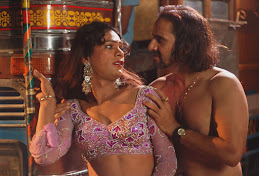International Film Festival of Kerala 2007
Sridhar Rangayan with Chilean filmmaker Miguel Littin
It's time to state propositions to break the infernal walls that marginalize
Report: Roseliz Francis
Politics, race, religion, economics, sexuality and regional differences; it was a kaleidoscope of images on marginalization that came from the panel of the first seminar of the 12th IFFK held at Hotel Horizon on 'Cinema of / at the Margins'. The illustrious panel consisted of Chilean filmmaker Miguel Littin, UK based filmmaker Horace Ove, Indian filmmakers P.T.Kunjumohammed and Sridhar Rangayan and film critic V.C.Harris.
An animated debate to define 'who' or 'what' is marginalized created a vivacious ambience. Miguel Littin said it was necessary to locate the center to be able to define the margins. Speaking of Latin American Cinema he said that there were several constraints on independent and woman filmmakers. he spoke about the dynamics of economics in cinema from third world countries. the fact that only six to seven films were produced in a country like Chile was attributed to the limited access to technology and the constraints in raising funds to produce and distribute films, which are also effected by the political resolutions of a state. He highlighted that it was the access to resources like capital and technology that sought immediate attention. he said that the cultural ambassadors of a country should facilitate an open market for cinema sans censorship. he envisioned a platform where the Latin American filmmakers shared a platform with Italian, French and Third world counterparts to emancipate the marginalized. He said it was "time to state propositions to break the infernal walls that marginalize".
Sridhar Rangayan, director of '68 Pages', voiced the subjugation of the 'Queer' filmmakers, who are themselves marginalized. He said that it was not the number, but the content of films that mattered. Though India produced over 1000 films a year, they fail to give a voice to the marginalized. He was talking of the homosexuals and transsexuals in particular. He added that the language of cinema today has to adhere to certain stereotypes to appeal to the masses. This adherence led to these oppressive classes being doubly stigmatized. He added that transgender characters were carved out in films only for dramatic conveniences and not for emancipating them. He criticized popular cinema like 'Kal Ho Na Ho' for ridiculing homosexuality but was highly appreciative of the Malayalam movie 'Sancharam', 'My Brother Nikhil' and 'Fire' for breaking conventions in portraying such issues. His was a clarion call for filmmakers to "make cinema rooted in reality and to make the marginalized more visible".
P.T.Kunjumohammed said it was his brief stint in Dubai in the early 70s that inspired him to defend his culture through his films as a defiance of the then existing European standards in cinema. In his 'Pardesi' he has tried to inculcate the singular voices of many who are marginalized.
Horace Ove, an independent filmmaker based in UK, opined that making independent films is not easy. All those who are ready to experiment should collaborate to form an autonomous film movement which could depict the political and social issues of the marginalized world over.
Film critic Dr.V.C.Harris spoke of marginalization at various levels. he spoke of the dominance of Hollywood films at the universal level; Bollywood being synonymous with Indian Cinema where regional cinema is marginalized and within regional films the upper hand that popular films have over parallel cinema. he also echoed Littin when he expressed "the need to establish a center to identify the margins".
A counter statement from a participant that margins no longer existed in cinema today took the discussion to the next level. However, all the panelists held that though anybody can make films today, the crux of the predicament lies in the reach of these films to a global audience.
Source: Official Bulletin of IFFK 2007, Dec.10

















No comments:
Post a Comment